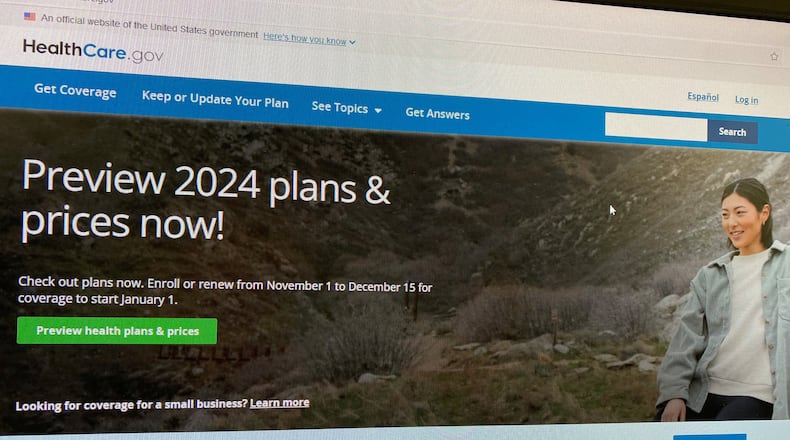Hundreds of thousands of Georgians who buy their health insurance on the Affordable Care Act marketplace website, healthcare.gov, will no longer be able to do that starting this year, and instead will be referred to a state-run website.
When open enrollment begins Nov. 1, residents of Georgia will be blocked from the federally operated website healthcare.gov and referred instead to a state-based website, georgiaaccess.gov, called Georgia Access.
Private, federally subsidized ACA plans first began in 2013 under former President Barack Obama and are also known as “Obamacare.”
The federal Centers for Medicare and Medicaid Services has given the state final approval to transition to its own marketplace after years of negotiation and work, according to a news release Wednesday.
Georgia Insurance Commissioner John King, whose office developed the Georgia Access system under Gov. Brian Kemp, was ebullient in making the announcement.
“This milestone is the result of the extraordinary work our office has conducted over the past three years to move Georgia away from reliance on the federal government for health coverage,” King said in the news release. “The Georgia Access approach is an innovative one. It will be the first State-based Exchange to partner with private sector companies to get consumers enrolled. It represents our commitment to expand access to affordable, quality health coverage and reduce the number of uninsured Georgians.”
The new state-run marketplace will bring with it millions of dollars in user fees that are collected with each policy sign-up. The fees up until now have gone to the federal website, but Georgia will collect them now.
“This is a great milestone in connecting Georgians with the coverage they need,” said Kemp, who started working on a state-based insurance exchange soon after becoming governor in 2019. In a written statement, he called the initiative “common sense” and one of his top priorities.
“A state-based exchange will not only make the process for Georgians getting covered easier, but will also increase their coverage options and our ability to promote quality and affordable health care plans.”
Record popularity
The ACA always offered states the opportunity to set up their own exchanges to run the federal subsidy program, and more than a dozen have, from Kentucky to Massachusetts to Idaho. But the leaders of conservative states like Georgia have not bolstered Obamacare, and Georgia even outlawed spending state money on ACA assistance. But in recent years, Kemp made the case he could take it over and got that ban repealed.
The state will have a hard act to follow when it comes to ACA sign-ups. The infusion of federal funds into the marketplace has driven record enrollment in Georgia, with 1.3 million Georgians signed up for ACA plans this year.
Under President Joe Biden, enrollment has surged as his administration restored resources that were cut under former President Donald Trump, like giving people more time to sign up and putting more money into advertising, outreach and enrollment assistance. In addition, during the pandemic, Biden and Congress enacted enhanced subsidies that drove down the cost of premiums and deductibles for a wide swath of enrollees. Enrollees flocked to the exchange.
Kemp also put state money into advertising the ACA and Georgia Access last year. Although Georgia Access can not yet sign people up, it contains information and links to businesses that do.
The questions for consumers: What kind of help will they get when they need to talk to an assistant or “navigator” who will help them shop for the best insurance plan? And will the state’s website work as well as shoppers’ current options, or better?
Not all 1.3 million Georgians covered under an Affordable Care Act plan shopped on healthcare.gov. About 550,000 enrolled on the popular website healthsherpa.com, according to company officials.
The benefit of both healthcare.gov and healthsherpa.com was that they automatically calculate the federal aid from subsidies and give shoppers their final premium, and then present the plans the person is eligible for so that shoppers can compare coverage and prices. They also only show plans that offer coverage meeting federal standards, thus protecting shoppers from being sold shoddy plans that don’t cover what they need.
HealthSherpa and King’s office did not respond Wednesday to questions whether HealthSherpa would continue offering sign-ups in Georgia after the state opens Georgia Access.
The concern patient advocates have about shopping directly with insurance companies or agents is that they are motivated to show people plans that will make their business more money, rather than plans that will give people the best coverage. Some patients have reported being switched into insurance plans that gutted their coverage and left them thousands of dollars in debt.
Federal laws meant to protect shoppers from shoddy coverage are still in force. King’s office has always overseen approval of Georgia’s ACA insurance offerings, and will continue to do so.
As of Wednesday evening, GeorgiaAccess.gov remained the state’s website. A website with a similar name, GeorgiaAccess.org, flipped a reader to the website of what appeared to be an insurance business called VIP Health Insurance, run by Victory Insurance Partners; the owner of the URL’s registration was kept private.
About the Author
Keep Reading
The Latest
Featured



